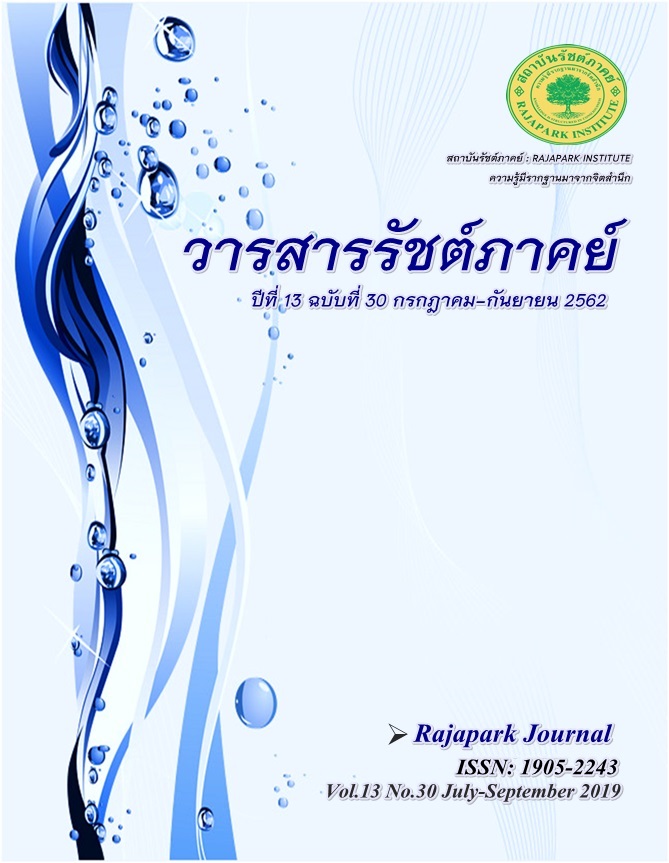The Relationship Among Internet Gaming Disorder, Depression Disorder, Attention Deficit Hyperactive Disorder, and Obsessive-Compulsive Disorder in High School Students with Internet Gaming Disorder of Bangkok
Main Article Content
Abstract
The objective of this study is to understand the relationship among Internet Gaming Disorder, Depression Disorder, Attention Deficit Hyperactive Disorder and Obsessive-Compulsive Disorder by using questionnaires, The Internet Gaming Disorder Scale, Center for Epidemiological Studies-Depression Scale (CES-D), Thai ADHD Screening Scale- Child version 10-18 years: Self Report, The Obsessive-Compulsive Inventory-Revised were used in high school students with online game addiction. Multi-stage sampling method was used and yielded 200 participants in Bangkok area. Data were analyzed by using correlation analyses. The results revealed a statistically significant relationship between Internet Gaming Disorder and Depression Disorder at the level of .05, between Internet Gaming Disorder and Obsessive-Compulsive Disorder at the level of .05, and between Internet Gaming Disorder and Attention Deficit Hyperactive Disorder at the level of .01. The research results suggested that, for the diagnosis of Internet Gaming Addiction, the presence of the condition of disease comorbidity such as Depression Disorder, Attention Deficit Hyperactive Disorder, and Obsessive-Compulsive Disorder need to be considered in order to plan for the proper treatment.
Article Details
Views and opinions appearing in the Journal it is the responsibility of the author of the article, and does not constitute the view and responsibility of the editorial team.
References
American Psychiatric Association.
Charoenwanit, S. (2014). Game Addiction Behaviors: Impacts and Preventions. Journal of Science and
Technology, 22(6), 871-879.
Foa, E. B., Huppert, J. D., Leiberg, S., Langner, R., Kichic, R., Hajcak, G., & Salkovskis, P. M. (2002). The
Obsessive-Compulsive Inventory: Development and validation of a short version. Psychological
assessment, 14(4), 485-495.
Hauge, M. R., & Gentile, D. A. (2003). Video game addiction among adolescents: Associations with academic
performance and aggression. Paper presented at the Society for Research in Child Development
Conference.
Kolkijkovin, V., Wisitpongaree, C., Techakasem, P., Pornnoppadol, C., & Supawattanabodee, B. (2015).
Computer Game Addiction: Risk and Protective Factors in Students in Dusit District, Bangkok. Vajira
Medical Journal, 59(3), 1-13.
Lemmens, J. S., Valkenburg, P. M., & Gentile, D. A. (2015). The Internet Gaming Disorder Scale. Psychol Assess,
27(2), 567-582.
Panyapas, S. (2015). Anxiety disorder, Obcessive-compulsive disorder, and school refusal in child and
adolescent. Bangkok: Prayoonsanthai Publishing.
Pearcy, B. T., McEvoy, P. M., & Roberts, L. D. (2017). Internet Gaming Disorder Explains Unique Variance in
Psychological Distress and Disability After Controlling for Comorbid Depression, OCD, ADHD, and
Anxiety. Cyberpsychology Behav Soc Netw, 20(2), 126-132.
Phosuwan, N. (2009). Causal Factors Affecting Game Addiction among Adolescents. Master of Arts, National
Institute of Development Administration.
Pornnoppadol, C., Sornpaisarn, B., Khamklieng, K., & Pattana-amorn, S. (2014). The Development of Game
Addiction Screening Test (GAST). J Psychiatr Assoc Thailand, 59(1), 3-14.
Pornnoppadol, C. (2015). Attention deficit disorder handbook for Teacher. Bangkok: Prayoonsanthai Publishing.
Pornnoppadol, C., & Wasupanjit, A. (2015). Internet Addiction. Bangkok: Prayoonsanthai Publishing.
Pornnoppadol, C. (2018). Understand and help children with attention deficit disorder part 5. Bangkok:
Prayoonsanthai Publishing.
Ryu, H., Lee, J. Y., Choi, A., Park, S., Kim, D. J., & Choi, J. S. (2018). The Relationship between Impulsivity and
Internet Gaming Disorder in Young Adults: Mediating Effects of Interpersonal Relationships and
Depression. Int J Environ Res Public Health, 15(3), 458.
Starcevic, V., & Aboujaoude, E. (2017). Internet Gaming Disorder, Obsessive-Compulsive Disorder, and
Addiction. Current Addiction Reports, 4(3), 317-322.
Thomyangkoon, P. (2005). Handbook when kids addicted to games. Bangkok: SE-ED education.
Trangkhasombat, U., Lapboonsap, W., & Pornhavanon, P. (1997). Using CES-D in screening for depression in
adolescents. J Psychiatr Assoc Thailand, 42(1), 2-13.
Trireangworawat, B. (2017). Warning for games as “MOBA” make brain addiction to game. Found teenagers
addicted to game increased 1.5 times in 3 years with psychiatric symptoms. Retrieved April 20, 2018,
from https://mgronline.com/qol/detail/9600000051471
Vongwanich, S., & Wiratchai, N. (2003). Guideline in research consultation. Bangkok: Textbook and Scientific
Paper Center, Faculty of Education, Chulalongkorn University.
Wisanuyothin, T., Wanphen, W., Wichai, S., Arunraeung, P., Yothinchatchawan, C., Tiamsaeng, T. et al. (2013)
Survey the status of risk behaviors and gaming addiction in the students of pilot schools with student
help system. Bangkok: Child and Adolescent Mental Health Rajanagarindra Institute.
Yen, J. Y., Liu, T. L., Wang, P. W., Chen, C. S., Yen, C. F., & Ko, C. H. (2017). Association between Internet
gaming disorder and adult attention deficit and hyperactivity disorder and their correlates: Impulsivity
and hostility. Addict Behav, 64, 308-313.

